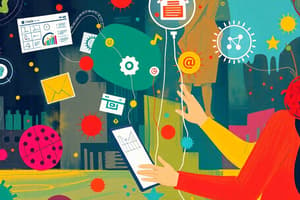Podcast
Questions and Answers
What is Cyber Literacy / Digital Literacy primarily defined as?
What is Cyber Literacy / Digital Literacy primarily defined as?
- The capacity to use digital technology to locate, analyze, and use information (correct)
- The ability to engage in face-to-face communication
- The skill of writing and publishing physical documents
- Having access to a computer and the internet
Which of the following represents a significant challenge related to Digital Literacy?
Which of the following represents a significant challenge related to Digital Literacy?
- Widespread use of social media platforms
- The existence of the digital divide among students (correct)
- Accessibility of internet resources for all users
- Increased availability of educational software
How has technology impacted traditional learning environments?
How has technology impacted traditional learning environments?
- Teachers are no longer responsible for verifying credible sources.
- Curricula are continuously updated to include digital tools and resources. (correct)
- Students must now complete all assignments on paper.
- It has eliminated the need for physical classrooms entirely.
Which of the following is NOT commonly included in the lessons about Digital Literacy skills?
Which of the following is NOT commonly included in the lessons about Digital Literacy skills?
Digital Literacy affects which group of individuals the most?
Digital Literacy affects which group of individuals the most?
What key skill is typically associated with Digital Literacy?
What key skill is typically associated with Digital Literacy?
Which tools are commonly utilized by students for research in the context of Digital Literacy?
Which tools are commonly utilized by students for research in the context of Digital Literacy?
What is an example of digital manipulation in relation to Digital Literacy?
What is an example of digital manipulation in relation to Digital Literacy?
What is one primary goal of developing Teacher's Digital Competence (TDC) during initial teacher training?
What is one primary goal of developing Teacher's Digital Competence (TDC) during initial teacher training?
Which of the following best describes a component of digital literacy?
Which of the following best describes a component of digital literacy?
Which digital competence involves using technology to collaborate and communicate effectively?
Which digital competence involves using technology to collaborate and communicate effectively?
How should educators perceive and integrate technology according to recent educational trends?
How should educators perceive and integrate technology according to recent educational trends?
Which of the following is NOT included in the areas of digital competencies?
Which of the following is NOT included in the areas of digital competencies?
In the context of incorporating digital technology in classrooms, which setting is now often being replaced?
In the context of incorporating digital technology in classrooms, which setting is now often being replaced?
What is a common misconception students may have about the role of ICT in society?
What is a common misconception students may have about the role of ICT in society?
Which area of digital competencies focuses on assessing the relevance of digital information?
Which area of digital competencies focuses on assessing the relevance of digital information?
What are the foundational competencies necessary for becoming digitally literate?
What are the foundational competencies necessary for becoming digitally literate?
Which of the following is NOT a component of digital literacy as described?
Which of the following is NOT a component of digital literacy as described?
How has the application of digital literacy impacted classroom teaching?
How has the application of digital literacy impacted classroom teaching?
Which of the following best defines digital literacy?
Which of the following best defines digital literacy?
What does 'seamless use demonstrating self-efficacy' refer to in digital literacy?
What does 'seamless use demonstrating self-efficacy' refer to in digital literacy?
Which aspect of digital literacy involves understanding the legal and ethical implications of technology?
Which aspect of digital literacy involves understanding the legal and ethical implications of technology?
Which of the following is a common barrier to achieving digital literacy?
Which of the following is a common barrier to achieving digital literacy?
What is a key benefit of having digital literacy in a professional setting?
What is a key benefit of having digital literacy in a professional setting?
Flashcards are hidden until you start studying
Study Notes
Cyber Literacy / Digital Literacy
- Ability to use digital technology, communication devices or networks to locate, analyze, use and produce information
- Includes being able to read, write and clarify media, replicate data and visuals through digital manipulation, and assess and implement new knowledge gained from digital environments
- Access to the internet plays a vital role in digital literacy, with many students relying on schools and public libraries for access.
Applications of Digital Literacy
- Schools are constantly updating their curricula to include computers in the classroom, educational software, and online course materials.
- Students are taught essential literacy skills like verifying credible sources online, citing websites, and preventing plagiarism.
- Google and Wikipedia are commonly used for research in today's education.
- Digital technology has significantly impacted classroom teaching methods, with educators adopting new technologies to enhance traditional lesson delivery.
- Educators are incorporating course material on concepts related to digital literacy.
- Social media platforms are also utilized for communication and idea sharing among educators.
- Smart boards and audience response systems are increasingly replacing traditional chalkboards and whiteboards in classrooms.
- Teacher’s Digital Competence (TDC) is essential and should be implemented in initial teacher training and throughout a teacher's career to effectively use Digital Technologies (DT) for improving teaching and professional development.
### Digital Competencies
- Digital literacy encompasses several areas of knowledge and skills.
- General knowledge and functional skills: Understanding basic digital devices and their elementary uses.
- Use in everyday life: Integrating digital technologies into daily life activities.
- Specialized and advanced competence for work and creative expression: Using ICT to enhance creativity and professional performance.
- Technology mediated communication and collaboration: Effectively connecting, sharing, communicating, and collaborating with others in a digital environment.
- Information processing and management: Utilizing technology to gather, analyze, and judge the relevance and purpose of digital information.
- Privacy and security: Protecting personal information and implementing appropriate security measures.
- Legal and ethical aspects: Behaving appropriately and responsibly in the digital environment and understanding legal and ethical considerations when using ICT.
- Balanced attitude towards technology: Maintaining an informed, open-minded, and balanced perspective on information society and digital technology use.
- Understanding and awareness of role of ICT in society: Recognizing the broader context of ICT use and development.
- Learning about and with digital technologies: Exploring emerging technologies and integrating them.
- Informed decisions on appropriate digital technologies: Identifying most relevant or common technologies.
- Seamless use demonstrating self-efficacy: Confidently and creatively applying digital technologies to enhance personal and professional effectiveness and efficiency.
- Competencies A, B, and C, which encompass general knowledge and functional skills, use in everyday life, and specialized and advanced competence for work and creative expression, are fundamental for becoming digitally literate.
- These fundamental competencies form the basis for developing the other competencies.
Studying That Suits You
Use AI to generate personalized quizzes and flashcards to suit your learning preferences.




